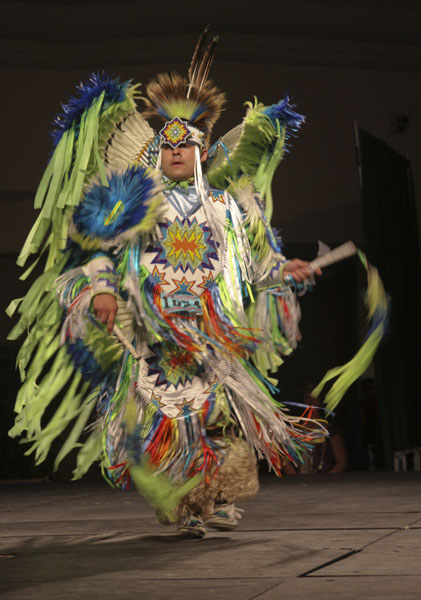Cultural dances take event spotlight

A Native American dancer represents a cultural dance at the sixth annual Multicultural Night on April 30. The event was held in the University Union and was hosted by Epsilon Sigma Rho, University Union UNIQUE programs and the Mutli-Cultural Center. :
May 12, 2009
The sixth annual Multicultural Night, hosted by Epsilon Sigma Rho, brought another night of cultural awareness to Sacramento State. Eleven performances presented what “multicultural” means to them. There was a fashion show of different traditional Asian dress and a Native American dance.
Andrew Marzan, junior sociology major and vice president of Internal Affairs for the fraternity, was in charge of organizing the event. His main concern this year was to make the event centered more around cultural awareness. In past years, people said the event seemed to be centered more around the multicultural fraternities and sororities’ stepping then about cultural awareness. “Stepping” in the Greek world, is a series of rhythmic stomps, claps and chants.
Marzan said the application process for performers was much more rigorous this year. Applicants were asked what multiculturalism means to them and how they would portray it in their performance to ensure cultural awareness was present.
Epsilon Sigma Rho, which usually steps during its performance, decided to use the time to award $500 to a charity known as Zero. The charity helps bring awareness to prostate cancer. Members also gave an award of appreciation to their faculty adviser, government professor James Di Sarro and recognized new brothers from the Gamma chapter at Chico State.
The event is “supposed to bring light and show off different cultures at Sac State,” said Shadi Karajeh, president of Epsilon Sigma Rho and undeclared junior.
The Japan Club, ENIT, which stands for Ensuring Native Indian Traditions, the African Connection Dance Team, and Capital Bhangra were some of the clubs and organizations that performed dances.
An ENIT member sang two songs that have been passed down in her family for many generations while wearing a throng of shells around her neck and holding a bamboo-like stick which was split at the end that her tribe used to keep rhythm when they sang. Another ENIT performer danced a classical tribal dance while wearing a large bright green, blue and white headdress.
The Japan Club’s dance was comprised of movements seen in the daily life of a fisherman such as throwing nets and gathering them up again. The club dressed in all black with a bright red robe that was emblazoned with a black Japanese characteristic on the back.
The African Connection Dance Team wore African clothing made up of black and green patterned short skirts and tops. They danced with African movements that are still visible today in some dance forms, particularly jazz dance which was majorly influenced by these types of movements.
Capital Bhangra is a competitive group of dancers who perform Punjabi folk dances. Although its dance maintained tradition with instruments, costume and props, the dancers still incorporated modern movements such as high-fives and shoulder bumps.
But dancing wasn’t the only type of performance.
A different sorority, Sigma Omicron Pi, which is the first Asian sorority in the Greek system, put on a fashion show with native dress from different Asian nations. Korea, China, Cambodia and the Philippines were among some of the nations represented. The Martial Arts club showed off some of their moves, including a “drunken” martial arts routine.
Marzan said different chapters in the fraternity participate in each other’s events.
Multicultural night originated at the University of California, Davis, four years before Epsilon Sigma Rho’s Sac State chapter picked up the idea. Sac State’s night was held last Thursday in the Union Ballroom.
Although the rivalries in sports are strong between UC Davis and Sac State, the fraternity sees itself in a different light, as brothers. The fraternity comes out to support members at most of its events, including local and regional events.
“We consider ourselves family,” said Marzan on the Sac State chapter of the fraternity. Epsilon Sigma Rho’s alumni come to a lot of events as well. The DJ for the multicultural night is a fraternity alumnus. Mario Escobar, also known as DJ CSCO, isn’t the only one who helped with the event.
Epsilon Sigma Rho was founded in 1986 at Sac state and is the first multicultural fraternity in the United States. The fraternity, which consists of 12 active members at the Sac State chapter, has chapters up and down California, including UC Davis, Fresno State, Chico State, and California State University, Monterey Bay.
Anne Morrison can be reached at [email protected].




























































































































